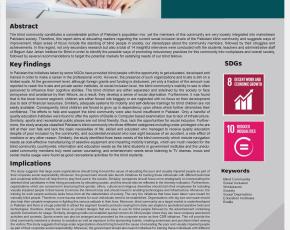Abstract
The blind community constitutes a considerable portion of Pakistan’s population mix, yet the members of this community are very loosely integrated into mainstream Pakistani society. Therefore, this report aims at educating readers regarding the current social inclusion levels of the Pakistani blind community and suggests ways of improvement. Major areas of focus include the standing of blind people in society, our stereotypes about the community members, followed by their struggles and achievements. In this regard, not only secondary research but also a total of 14 insightful interviews were conducted with the students, teachers and administrative staff of Begum Aziz Jehan Institute for Blind in order to identify the possible ways of promoting inclusionary practices for this community into workplaces and overall society, followed by several recommendations to target the potential markets for satisfying needs of our blind fellows.
Key findings
In Pakistan the initiatives taken by some NGOs have provided blind people with the opportunity to get educated, developed and trained in order to make a career in the professional world. However, the presence of such organizations and trusts is still on a limited scale. At the government level, although foreign grants and funding is disbursed, yet only a fraction of the amount was reported to reach the trusts and private sector institutes. At social inclusion level, the blind community’s inability to see is often perceived to influence their cognitive abilities. The blind children are either separated and sidelined by the society or face annoyance and avoidance by their fellows, as a result, they develop a sense of social deprivation. Furthermore, it was found that in the lower income segment, children are either forced into beggary or are neglected with no focus on their development due to lack of financial resources. Similarly, adequate systems for mobility and self-defense trainings for blind children are not easily available. Consequently, blind children are forced to grow up in dependency upon others which further diminishes their confidence. The efforts to help and support the blind community were also found insufficient in Pakistan. Only a handful of quality education institutes were found to offer the option of Braille or Computer based examination due to lack of infrastructure. Similarly, sports and recreational public places are not blind friendly, thus, lack the opportunities for social inclusion. Furthermore, the study analysis classified Pakistan’s blind community into three different categories including under-privileged who are left at their own fate and lack the basic necessities of life; skilled and educated who managed to receive quality education despite of poor inclusion by the community; and accidental/unnatural who lose sight because of an accident, a side effect of medicine or any other reason. Similarly, the study identified three basic needs of the blind community which include navigation needs as cost-effective manufacturing of assistive equipment and imparting mobility trainings, which are much needed for the blind community countrywide, information and education needs as the blind students in government institutes and the uneducated community members truly need career counseling, and entertainment needs since listening to TV dramas, music and social media usage were found as good recreational activities for the blind students.
Implications
The study suggests that large-scale organizations should bring forward the cause of educating the poor and visually impaired people as part of their corporate social responsibility. Moreover, the government should also launch initiatives for training these individuals with different technical and vocational skills that will help them to play their part in the society. Similarly, companies should focus more strategically on incorporating the talented blind candidates in their hiring procedures by allocating quotas, and this should also be reflected in the diversity indicators. Furthermore, organizations which are concerned in improving their gender, ethnic, cultural and religious diversities should train their employees for including visually impaired people in their teams to remove the inherent bias and should invest in enabling technologies and infrastructure. Moreover, the training for such people seriously lacks focus from all the stakeholders of society. The very few initiatives that have been taken were meant for naturally blind people. Therefore, more trauma centers for such individuals need to be established. Organizations with big size and scale should also help their valuable employees in fighting this serious setback in their lives. Moreover, blind community as a target market is underdeveloped in Pakistan and there is a huge potential to attract the segment towards products varying from daily use staples to specialized assistive tools and technologies, therefore, brands can focus on product designs that are easy to use for blind people followed by the advertisement containing specific instructions for usage. Similarly, shopping malls can establish special corners for blind people where they can have company sponsored activities and contests. Sports events can also be arranged and promoted by the corporate sector as their CSR initiatives. This will provide the blind community members a chance to socialize as well as exposure to the sponsoring brands, creating awareness and purchase intent among the visitors.














